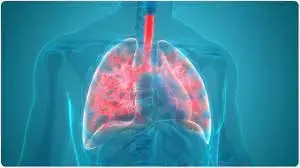- Home
- Medical news & Guidelines
- Anesthesiology
- Cardiology and CTVS
- Critical Care
- Dentistry
- Dermatology
- Diabetes and Endocrinology
- ENT
- Gastroenterology
- Medicine
- Nephrology
- Neurology
- Obstretics-Gynaecology
- Oncology
- Ophthalmology
- Orthopaedics
- Pediatrics-Neonatology
- Psychiatry
- Pulmonology
- Radiology
- Surgery
- Urology
- Laboratory Medicine
- Diet
- Nursing
- Paramedical
- Physiotherapy
- Health news
- Fact Check
- Bone Health Fact Check
- Brain Health Fact Check
- Cancer Related Fact Check
- Child Care Fact Check
- Dental and oral health fact check
- Diabetes and metabolic health fact check
- Diet and Nutrition Fact Check
- Eye and ENT Care Fact Check
- Fitness fact check
- Gut health fact check
- Heart health fact check
- Kidney health fact check
- Medical education fact check
- Men's health fact check
- Respiratory fact check
- Skin and hair care fact check
- Vaccine and Immunization fact check
- Women's health fact check
- AYUSH
- State News
- Andaman and Nicobar Islands
- Andhra Pradesh
- Arunachal Pradesh
- Assam
- Bihar
- Chandigarh
- Chattisgarh
- Dadra and Nagar Haveli
- Daman and Diu
- Delhi
- Goa
- Gujarat
- Haryana
- Himachal Pradesh
- Jammu & Kashmir
- Jharkhand
- Karnataka
- Kerala
- Ladakh
- Lakshadweep
- Madhya Pradesh
- Maharashtra
- Manipur
- Meghalaya
- Mizoram
- Nagaland
- Odisha
- Puducherry
- Punjab
- Rajasthan
- Sikkim
- Tamil Nadu
- Telangana
- Tripura
- Uttar Pradesh
- Uttrakhand
- West Bengal
- Medical Education
- Industry
Pneumonia-related AF should not a transient and benign finding: JAMA

Danish researchers have found in a new study that Pneumonia-related atrial fibrillation (Afib) should not be considered a transient and benign finding. Further patients could be left with recurrent Atrial fibrillation and an increased thromboembolic risk if they didn't start anticoagulants
New-onset atrial fibrillation (AF) is commonly reported in patients with severe infections. However, the absolute risk of thromboembolic events without anticoagulation remains unknown.
A study was conducted to investigate the thromboembolic risks associated with AF in patients with pneumonia, assess the risk of recurrent AF, and examine the association of initiation of anticoagulation therapy with new-onset AF.
This population-based cohort study used linked Danish nationwide registries. Participants included patients hospitalized with incident community-acquired pneumonia in Denmark from 1998 to 2018. Statistical analysis was performed from August 15, 2021, to March 12, 2022.
Results:
- Among 274 196 patients hospitalized for community-acquired pneumonia, 6553 patients developed new-onset AF.
- The 1-year risk of thromboembolism was 0.8% in patients without AF vs 2.1% in patients with new-onset AF without anticoagulation; this risk was 1.4% among patients with AF with intermediate stroke risk and 2.8% in patients with AF with high stroke risk.
- Three-year risks were 3.5% among patients with intermediate stroke risk and 5.3% among patients with high stroke risk.
- Among patients with new-onset AF, 32.9% had a new hospital contact with AF, and 14.0% initiated anticoagulation therapy during the 3 years after incident AF diagnosis.
- At 3 years, the all-cause mortality rate was 25.7% in patients with pneumonia without AF vs 49.8% in patients with new-onset AF.
This cohort study found that new-onset AF after community-acquired pneumonia was associated with an increased risk of thromboembolism, which may warrant anticoagulation therapy. Approximately one-third of patients had a new hospital or outpatient clinic contact for AF during the 3-year follow-up, suggesting that AF triggered by acute infections is not a transient, self-terminating condition that reverses with a resolution of the infection.
Reference:
Thromboembolic Risk in Patients with Pneumonia and New-Onset Atrial Fibrillation Not Receiving Anticoagulation Therapy by Mette Søgaard, et al. published in the JAMA Network Open.
doi:10.1001/jamanetworkopen.2022.13945
Dr. Shravani Dali has completed her BDS from Pravara institute of medical sciences, loni. Following which she extensively worked in the healthcare sector for 2+ years. She has been actively involved in writing blogs in field of health and wellness. Currently she is pursuing her Masters of public health-health administration from Tata institute of social sciences. She can be contacted at editorial@medicaldialogues.in.
Dr Kamal Kant Kohli-MBBS, DTCD- a chest specialist with more than 30 years of practice and a flair for writing clinical articles, Dr Kamal Kant Kohli joined Medical Dialogues as a Chief Editor of Medical News. Besides writing articles, as an editor, he proofreads and verifies all the medical content published on Medical Dialogues including those coming from journals, studies,medical conferences,guidelines etc. Email: drkohli@medicaldialogues.in. Contact no. 011-43720751


